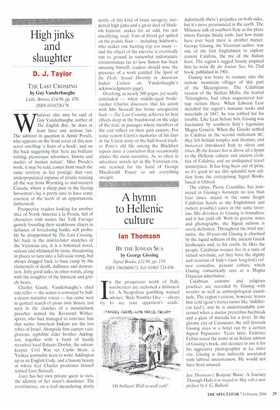A hymn to Hellenic culture
Ian Thomson
BY THE IONIAN SEA by George Gissing Signal Books, L12.99, pp. 159, ISBN 1902669673, Tel: 01865 724 856 1 n the prosperous north of Italy, southerners are reckoned a dishonest lot. A Neapolitan gambling manual advises: 'Rule Number One — always try to see your opponent's cards.'
Admittedly there's prejudice on both sides, but it's more pronounced in the north. The Milanese talk of southern Italy as the place where Europe finally ends. Just how many have ever been there is another matter. George Gissing, the Victorian author, was one of the first Englishmen to explore remote Calabria, the toe of the Italian boot. The region's rugged beauty inspired him to write By the Ionian Sea, his 23rd book, published in 1901.
Gissing was brave to venture into the remote mountain villages of this part of the Mezzogiorno. The Calabrian version of the Sicilian Mafia, the fearful 'Ndrangheta, had often sequestered kidnap victims there. When Edward Lear sketched the region's fantastic rocks and waterfalls in 1847, he was robbed for his trouble. Like Lear before him. Gissing was fascinated by southern Italy's legendary Magna Graecia. When the Greeks settled in Calabria in the second millenium BC, they left behind temples and theatres, and moreover introduced Italy to olives and vines. By the Ionian Sea is above all a hymn to the Hellenic culture and ancient civilities of Calabria, and an undisputed travel masterpiece. It has long been out of print, so it's good to see this splendid new edition from the enterprising Signal Books, based in Oxford.
The editor, Pierre Coustillas, has journeyed in Gissing's footsteps no less than four times, stayed in the same fleapit Calabrian hotels as the Englishman and (where possible) eaten in the same tavernas. His devotion to Gissing is boundless, and it has paid off. With its precise notes and photographs, the Signal edition is surely definitive. Throughout the brief narrative, the 40-year-old Gissing is charmed by the liquid softness of the ancient Greek landscapes and, to his credit, he likes the people. Calabrian women live in a state of virtual servitude, yet they have the dignity and stoicism of Italy's (now long-lost) cultura contadina, peasant culture, which Gissing romantically sees as a Magna Graecian inheritance.
Calabrian customs and religious practices are recorded by Gissing with wonder as well as anthropological exactitude. The region's cuisine, however, leaves him cold (goat's butter tastes like 'indifferent lard'), and he is understandably concerned when a doctor prescribes beefsteak and a glass of marsala for a fever. In the gloomy city of Catanzaro, the still feverish Gissing stays in a hotel run by a certain Signor Paparazzo. Years later, Federico Fellini noted the name in an Italian edition of Gissing's book, and decided to use it for his aggressive photographer in La dolce vita. Gissing is thus indirectly associated with tabloid intrusiveness. He would not have been amused.
Ian Thomson's Bonjour Blanc: A Journey Through Haiti is re-issued in May wih a new preface by J. G. Ballard.


























































 Previous page
Previous page